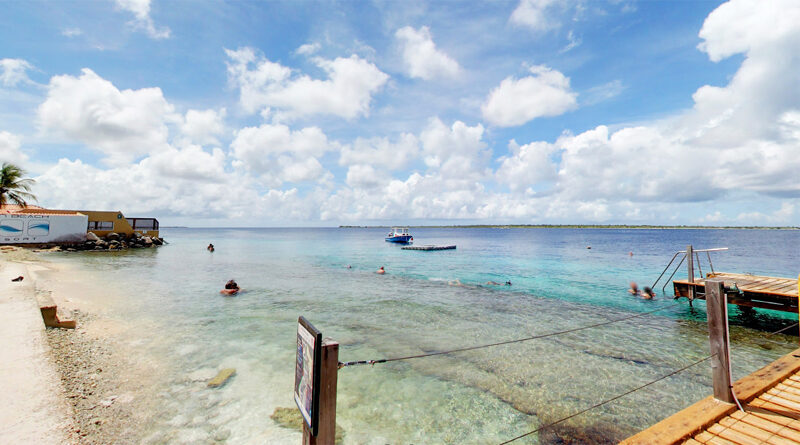Q&A: REEF RENEWAL FOUNDATION IN BONAIRE
The importance of coral reefs as marine habitats cannot be understated, and preserving them, around the world, is essential to protect our sea life. Reef Renewal Bonaire (RRFB) is a non-profit organization dedicated to protecting and restoring coral reefs in Bonaire in the Dutch Caribbean. We spoke with Caitie Reza, their Communication and Development Officer, about the work they are doing:
With the help of our community and key research partners, we implement large-scale restoration programs. These strengthen populations of key coral species that are vital to Bonaire’s marine ecosystem. Our aim is to give Bonaire’s reefs the scale, genetic diversity, and resilience they need to thrive in today’s uncertain and ever-changing environment.
WHAT INSPIRED YOU TO BECOME PART OF REEF RENEWAL FOUNDATION BONAIRE?
I’ve always been inspired by animals – both above and below water. After studying Zoology at University and working as a field biologist, I found my niche in writing about biology and anything nature-related. I discovered that science communication allowed me to have one foot in the research and conservation world, and one foot in the writing and communication world. When I saw that RRFB was hiring a Communication and Development Officer, I knew I needed to apply.
I moved to Bonaire for this job after completing graduate school in California and feel inspired by the people and creatures on this island every day. I never dreamed I’d have the opportunity to work with such an incredible team of passionate marine conservationists who work incredibly hard to restore coral reefs.
WHAT ARE THE ISSUES THAT REEFS IN BONAIRE FACE?
Bonaire’s reefs currently face a variety of issues, on both a local and global scale.
Local/regional threats:
Hurricanes: Storms are becoming more frequent and increasingly unpredictable in the Caribbean. Healthy reefs are built to withstand and even protect coastlines from strong storm surges– but corals that are weakened by the factors below (and more!) are less likely to survive major storm events.
Diseases: Reefs in the Caribbean are exposed to a variety of diseases that can be devastating to coral populations, including white-band disease and Stony Coral Tissue Loss Disease (SCTLD). Unfortunately, SCTLD reached Bonaire’s reefs earlier this year and is quickly spreading through populations of at least nine coral species around the island – including six species that RRFB focuses on. SCTLD is a highly contagious, lethal virus that is spread through the water column and therefore quite difficult to contain and monitor. Find out more about how Bonaire’s National Marine Park is combating the spread of SCTLD here.
Loss of sea urchins: Sea urchins play an important role in the coral life cycle by eating algae off the reef, giving coral larvae a suitable place to settle and develop. With the near-extinction of long-spined sea urchins in the 80’s due to a virus, coral populations in the Caribbean experienced a devastating decline.
Bleaching: In short, bleaching occurs when corals are stressed. Environmental stressors encompass everything from rapid changes in temperature and light exposure to pollution and predation. When exposed to stressful conditions, coral expels the algae living within its tissue, called “zooxanthellae”, which provides coral with the nutrients it needs to survive. It’s important to note that bleaching is reversible – but only if conditions return to normal.
Globally: Coral reefs around the world, including Bonaire’s, are not immune to the effects of climate change, including rising sea temperatures and ocean acidification.
HOW IS THE FOUNDATION HELPING TO TACKLE THIS?
RRFB propagates (produces a lot of) and outplants (places back on the reef) 10 threatened coral species on Bonaire. We use two restoration techniques to do this: fragmentation (also called coral gardening) and larval propagation.
The combination of these methods ultimately allows us to increase the size and, importantly, the genetic diversity of populations here on Bonaire. In doing so, we’re creating a more resilient reef that is better able to withstand the threats that I just talked about.
Like any restoration or conservation initiative, involving the community is integral to our success. We run a thriving volunteer program and implement a variety of educational programs that encourage Bonaire’s youth to get involved in coral restoration and marine conservation.
WHAT IS YOUR NEXT PROJECT?
Fragmentation: So far, we have more than 10 active coral nurseries around the island with the capacity to hold over 18,000 corals. We’re aiming to scale up coral production in our nurseries by 20% – allowing us to outplant more corals in more places around the island.
Larval propagation: We’re also expanding the number of species we focus our larval propagation efforts on. This year, we plan to sexually propagate four key coral species – including, for the first time ever, elkhorn coral (Acropora palmata). Larval propagation allows us to boost the genetic diversity of Bonaire’s coral populations, making them more resilient to environmental threats.
WHERE CAN WE FIND OUT MORE IN THE UK?
Follow our socials (Facebook, Instagram, & LinkedIn) to stay up to date with all of our latest projects and updates!
You can read more about what we do and who we are on our website: reefrenewalbonaire.org.
Watch our latest video exploring our larval propagation program From Polyp To Reef: Reinvigorating Bonaire’s Coral Sanctuaries, and don’t forget to check out the rest of our YouTube channel!

